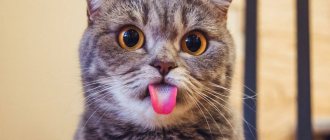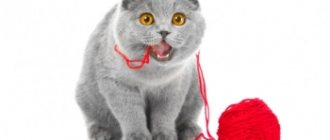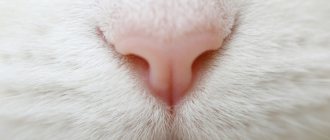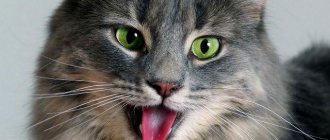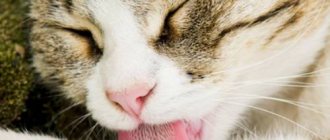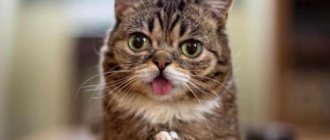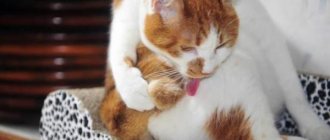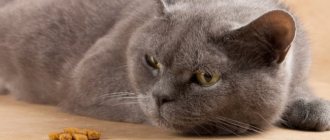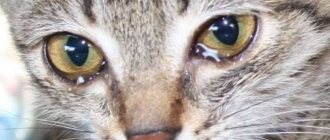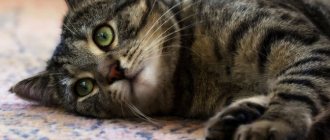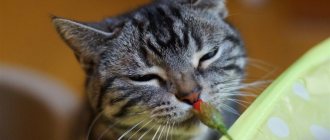Diseases that may cause a cat to stick out its tongue
- Serious damage to the jaw
- Insufficiency of the cardiovascular system
- Disruption of natural processes occurring in the brain
- Mental disorder, nervous overstrain, severe fear
- Brain injury
- Increased body temperature
- Muscle atrophy
- Dental problems
- Breathing problems
- Disorders of the salivary glands
- Recovery from anesthesia. The cat will be able to completely close its mouth only a day after it.
- Sores or ulcers in the mouth.
- Stomach-related diseases: vomiting, diarrhea. The cause may be poisoning.
Possible diseases
Why a cat tramples its paws: the main reasons and what it means
In some cases, a tongue falling out of the mouth is a reason to worry.
How does an animal behave if it gets sick?
Respiratory diseases
Sometimes cats stick out their tongues and breathe like dogs due to diseases such as rhinitis, ARVI, tracheitis, pneumonia and bronchitis. The main signs of the disease are difficulty breathing, coughing, wheezing when inhaling and exhaling, wheezing, lack of appetite, and nasal discharge. Temperature may also rise and apathy may appear.
Poisoning
Cats may sit with their tongue hanging out if their body is intoxicated. Animals may experience symptoms such as disturbances in the functioning of the respiratory tract and coordination, excessive salivation, vomiting, diarrhea, tremors, dilated pupils, and convulsive muscle contractions. Usually in this state the cat feels increased anxiety or complete apathy.
Infections
A protruding tongue can be observed in cats in the case of infectious diseases such as rhinotracheitis, chlamydia and calcivirosis. In this case, animals may exhibit the same symptoms as in the case of respiratory disease. In addition, pets may have bowel movements and purulent discharge from the nose and eyes. The infection can also cause swelling in the mouth, causing the tongue to fall out of the mouth.
Important! If the cat begins to show aggression, it has profuse salivation, an open mouth and bulging eyes, then this may indicate the presence of rabies.
In the case of an infectious disease, the animal also behaves strangely
Tumors
Oncology of the oral cavity is one of the most dangerous causes of a protruding tongue. If there is plaque, bleeding, bad breath, a hoarse voice, problems chewing or swallowing, or painful mouth ulcers, your pet needs immediate medical attention.
Note! A cat can stick out its tongue not only due to a malignant tumor, but also in the case of polyps located in the oral cavity.
Heart failure
Such a serious illness as heart failure is often accompanied by pulmonary edema. This causes the cat to try to breathe from its belly rather than from its chest, with its tongue usually sticking out. Signs of this disease are a weak appetite or its complete absence, the tongue and gums acquire a blue tint, a distinct hoarseness appears when breathing, the heartbeat quickens, coordination of movements is impaired, the work of the hind legs is not always synchronous, some of the receptors may be paralyzed. Cats may also stick out their tongue due to conditions such as ischemia, angina, and hypertension.
Kidney failure
Sometimes you can observe that a cat sticks out its tongue and at the same time breathes very heavily. This usually happens when there is a problem with the kidneys. Signs of kidney failure are the following symptoms: unpleasant odor from the mouth (with an ammonia taste), vomiting and diarrhea, mucous membranes acquire a yellow tint, deterioration in the condition of the coat and skin, weight loss. The cat may also experience extreme thirst, frequent urination, blurred vision, and severe swelling in the abdomen.
Foreign object in the respiratory organs
An animal that gets too playful may swallow a small toy.
A sticking out tongue is a common reaction to such a problem. If a foreign object is in the respiratory tract, the cat usually begins to actively sneeze, cough (in some cases with blood), her eyes water and her breathing is impaired (heavy, frequent and noisy inhalations and exhalations).
Swelling of the larynx due to allergies
Sometimes a similar reaction of an animal can be observed in case of allergies. The most common allergens are medications or food consumed. As a result, swelling of the larynx may occur. Symptoms include enlarged palate and tonsils, respiratory problems (infrequent, deep and slow breaths may be accompanied by coughing), slow heartbeat, problems swallowing, hoarse voice and restlessness.
Jaw injury
If there is no appetite, excessive salivation and prolapse of the tongue, the cat should be checked for a dislocated jaw. In case of bilateral dislocation, the pet is deprived of the ability to close its mouth. If a unilateral dislocation occurs, then the animal’s mouth, as a rule, is slightly open, with the jaw noticeably protruding to the side.
Oral inflammation
Sometimes cats have problems with breathing and oral control in cases of stomatitis and gingivitis. The animal's tongue, being behind the teeth, can touch painful ulcers (stomatitis) or inflamed gums (gingivitis). The only thing a cat can do to alleviate the discomfort is stick out its tongue. With stomatitis, animals experience symptoms such as an unpleasant odor from the mouth, the inability to chew food normally, excessive salivation, the formation of ulcers in the mouth, and sometimes the body temperature may rise.
Note! In the case of gingivitis, the symptoms are almost completely the same as dental ones (with the exception of ulcers).
Inflammation in the oral cavity can greatly bother a cat.
Brain disorders
In cases of disturbances in the activity of parts of the brain responsible for respiratory and other processes, cats may experience problems with tongue control, which are caused by difficulty in inhaling and exhaling.
Tongue protrusion when feeling normal
- Kittens may stick out their tongues when they are very tired after playing or a day full of different experiences. The protruding tip of the tongue indicates that they are tired and want to sleep.
- The tongue may stick out from behind the mouth when the cat is relaxed or sleeping. When an animal is in this state, this organ becomes slightly elongated and may not fit in the mouth.
- Rapid breathing, which appears in a pet after games, a long run and other vigorous activity, contributes to the desire to stick out its tongue. This promotes active saturation of tissues with oxygen.
- This way the cat can escape the extreme heat. This is explained by the fact that the pet does not have sebaceous glands, like humans, and it somehow needs to protect itself from overheating.
- Expressing emotions during play or other activities. A cat can express its attitude towards something this way or simply tease its owner. If this behavior has already become a habit, then there is no need to worry. The alarm should be sounded if there is a suspicion of a certain disease.
Why does a cat sleep with its tongue hanging out?
- The most common reason why a cat hangs its tongue is a state of complete relaxation. This is a universal phenomenon for sleeping or napping cats. This is the effect of relaxing the jaw.
- Some experts interpret the tongue sticking out as a sign of complete bliss for the cat. Of course there is no need to worry. A relaxed cat is a lucky cat. And a happy cat is a joy to its owners!
Tongue protrusion is especially common in cats that have missing front teeth. So, if you have an old cat at home, then you are probably more likely than other owners to notice the tip of his tongue sticking out.
Features of cat physiology
- In hot weather, the animal's heat exchange may be disrupted. This is what the sticking out tongue says.
- If this behavior is accompanied by aggression and increased salivation, this indicates the presence of rabies or another serious infectious disease.
- The organ does not fit in the mouth. This may be a feature, or it may indicate the presence of oral diseases. This could be damage to the mouth, jaw or teeth.
- Mental retardation from birth. In such inferior kittens, which could have been bred in the process of crossing several breeds, this is an innate feature.
- Expression of fear at sharp, loud, unpleasant sounds. Many cats react this way to tape coming off. And for some others, such a reaction is observed with the cotton that is heard when champagne is opened.
- This unusual behavior may be quite normal for certain breeds of cats. Most often, this is how four-legged friends show their devotion and trust in their owner. However, some express delight in this way.
- Impaired sense of smell. The pet sticks out its tongue because it cannot catch some odors. And this causes him some inconvenience.
- The onset of labor, which is accompanied by strong nervous tension and intense licking of fur. Due to excitement and unpleasant sensations, the cat simply forgets about this organ, and it involuntarily falls out of its mouth.
- A bone stuck in the mouth, teeth or even throat. This is usually accompanied by certain sounds: coughing or snorting. The cat may also try to pick at its mouth with its paw. If you notice such symptoms, you should immediately contact a veterinary clinic.
- This is how pets can react to dogs. Especially if they have already had unpleasant experiences with these animals.
The cat sleeps with the tip of his tongue sticking out
First, make sure it's just relaxation. Unless your cat is sick, tongue protrusion does not pose a threat to his health. This is a natural behavior that will likely last no more than a few minutes and will bring a small smile to your family's face. However, if a cat cannot or does not want to close its mouth, this is unfortunate because it may indicate health problems.
Make sure that none of the above cases that may indicate health problems are related to your pet.
Veterinarians' opinion
But not all physiological reasons can be considered normal, although in these cases it is hardly possible to help the pet. You just need to carefully monitor his condition.
Read also: How much protein and carbohydrates are in cottage cheese
Structure of the skull
With a brachycephalic skull structure, the cat’s tongue is also constantly visible, since the mouth is half open. This is typical for some breeds with malocclusion, for example, Exots, Persians.
Costs of breeding work
When breeding many beautiful and exotic breeds, defective individuals are sometimes born. For example, with dropsy of the brain, joint disease, abnormal structure of the spine. Often with these pathologies, animals are forced to breathe with an open mouth with their tongue hanging out.
A striking example of this is the cat Melissa, who suffers from a severe disease called osteochondraplasia. In this case, acute bone dystrophy also affected the jaw. Her tongue does not retract into her mouth at all. And although netizens are touched by her image, similar to the famous photograph of Albert Einstein, both the pet and the owner suffered a lot from such a life. Veterinarians advised to euthanize the animal, but the cat's owner decided to take care of the baby until the last minute.
